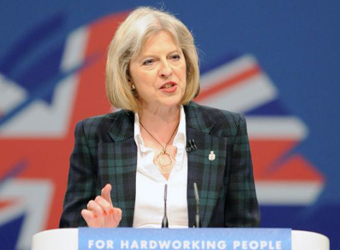U.K. Prime Minister Theresa May embarks this week on a determined push to bring her divided Cabinet together and come up with a Brexit plan.
As European negotiators show increasing signs of impatience, senior U.K. ministers are preparing to deliver a series of speeches in the coming weeks setting out a vision of life outside the European Union. They’ll culminate with an address by May.
Dubbed a “Road Map to Brexit,” the schedule begins on Wednesday when Foreign Secretary Boris Johnson issues an appeal to both sides of the Brexit debate. May is expected to offer a new security relationship three days later when she addresses a conference in Munich.
Also scheduled to make speeches are Brexit Secretary David Davis, Trade Secretary Liam Fox, and Cabinet Office Minister David Lidington. Absent, however, is Chancellor of the Exchequer Philip Hammond, who enraged Brexit supporters in January by suggesting Britain would see only “very modest” changes to its relationship with the EU once it leaves the bloc.
May has ordered key ministers to attend an “away day” at Chequers, the prime ministerial country retreat outside London, after two meetings to find a joint position on Brexit ended without agreement last week.
With just 13 months to go before Britain exits the EU, the ruling Conservatives are mired in a civil war between those who want to retain close ties to the bloc and hard-liners demanding a clean break, including total withdrawal from the EU single market and the customs union.
Contingency Plans
On Friday, Michel Barnier, the EU’s chief Brexit negotiator, expressed his exasperation by warning that the post-Brexit bridging period that once seemed a certainty “is not a given,” prompting investors to sell the pound. Businesses have said they’ll start to activate contingency plans to move jobs and operations out of the U.K. unless a transition deal is nailed down by the end of March.
In her speech to cap off the “Road to Brexit” push — the date of which hasn’t been announced — May will set out the government’s “ambitions for Britain’s partnership with the EU after we have left.” It will be her third major address, following her Lancaster House speech in January last year and her Florence speech in September.
“Brexit is a defining moment in the history of our nation,” May’s office said in a statement. “We will be forging an ambitious new partnership with Europe and charting our own way in the world to become a truly global, free-trading nation.”
Parliament Vote
Among the Conservatives opposing of Brexit is Anna Soubry, who made a joint appearance on television with the pro-EU Labour lawmaker Chuka Umunna on Sunday.
Asked in a BBC interview whether she believed there is a majority in the House of Commons to defeat “the kind of Brexit the prime minister wants,” Soubry replied: “If she’s not careful, yes.”
Members of Parliament have been promised a “meaningful vote” on the terms of Brexit before it happens.
The opposition Labour Party has its own struggles over Brexit, with its supporters also split. Speaking on Sunday, Shadow Chancellor John McDonnell said he favored a general election over a re-run of the 2016 Brexit referendum, which he said would “divide the country again.”


